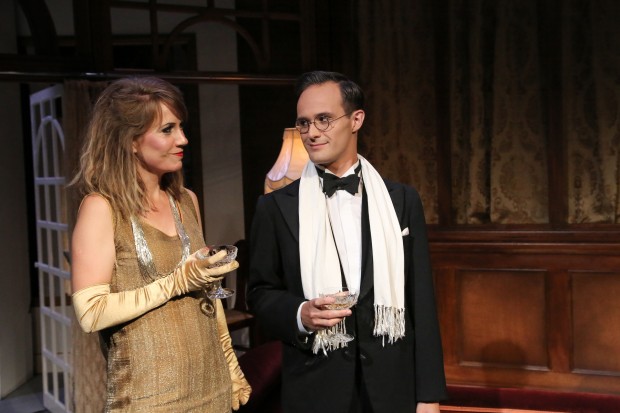You have no items in your cart. Want to get some nice things?
Go shopping
In a recent observer Observer, film director Mark Cousins wrote about the intimidating nature of many arts venues which, he feels, are dominated by middle-class values and culture. He complained about them feeling “exclusive…too narrow, too defined by class” and that they “scare people or make them feel stupid or small”. He makes a good argument for hi-lo art, a mixture of “working-class and posh elements” in order to encourage more diverse audiences. “Yes, beam in opera,” he concludes, “but have fishfinger sandwiches too”.
That’s what I like about OperaUpClose’s approach to this classic form: their eclectic choice of venues, contemporary reinterpretation of themes and fearless reworking of popular melodies for a trio. They staged their first mini-opera in a 35-seat room above Kilburn’s Cock Tavern before moving into London’s oldest pub theatre, the King’s Head in Islington. The venue was re-launched as London’s Little Opera House in 2010 and, just to shake things up further, Mark Ravenhill (author of Shopping and Fucking) was made associate director.
OperaUpClose has co-produced four English-language operas with Soho Theatre, which is where I’ve previously seen their work. Their first production, Puccini’s La Bohème married high culture with elements that could have come straight out of a television soap. The young performers slouched around in jeans and trainers, trading insults like an ordinary bunch of lads enjoying a night out on the town… before bursting into song. La Bohème extended its initial run at the Cock Tavern Theatre from six weeks to six months, which says a lot. It transferred to the Soho, where it enjoyed two sold-out runs, and won the 2011 Olivier Award for Best Opera Production.
Then the team turned their talents to Mozart’s Don Giovanni and it premiered at their new home, The King’s Head. Robin Norton-Hale’s succinct reworking blended dark comedy, melodrama and the supernatural to great effect. Set in London in the early noughties, Don Giovanni was recast as Johnny, an amoral city trader, on the prowl for new women and hedonistic experiences, accompanied by his reluctant, but ambitious, intern, Alexander.
Last year, Adam Spreadbury-Maher’s vivid interpretation of Puccini’s Tosca relocated the opera to East Germany in 1989, just before the fall of the Berlin wall, and focused on the Stasi’s persecution of dissidents.
Their current production at the Soho Verdi’s La Traviata, has been brilliantly pared down to just five performers and a trio of clarinet (Sarah Douglas), cello (William Rudge) and piano (Alex Beetschen) by composer Harry Blake. Norton-Hale’s more traditional staging uses one elegant wood-panelled box set. The action takes place in the hedonistic 1920s and focuses on the moral hypocrisy of the American political class. Norton-Hale has recast Germont as a US senator while Violetta is a socialite, “kept” by a baron, who falls for Germont’s son Alfredo (Lawrence Olsworth-Peter). Hoping for re-election, Germont urges Violetta to leave Alfredo in order to save his political career and the marriage of his daughter – her “reputation” threatens to sully both. As usual, there are three alternate performers for the principle roles. On the opening night, Louisa Tee was terrific as Violetta; glamorous, touching and with a voice to match. Some of the best moments come during her duets with James Harrison’s vocally limber Germont.
I don’t think Cousins could take issue with OperaUpClose’s productions or their choice of London venues. The Cock Tavern is notoriously rough and one of the principle pleasures of visiting The King’s Head is the ability to enjoy a pint of ale while watching the performance. Admittedly, Soho is a purpose-built venue but what makes it special is that it is home to comedy, cabaret, new writing and more experimental forms of theatre. Furthermore, the architecture is open and inviting with its bar and café area immediately visible through large glass windows. Punters spill onto the street to smoke and chat both before and after the shows. OperaUpClose has utilised the space well in the past, taking over the theatre’s bar for an immersive second act of La Bohème. This also allowed random passers-by a free taster. You can’t get more egalitarian than that.
Opera is undoubtedly still considered high art and largely the domain of the wealthy – so it is refreshing to find OperaUpClose playing in fringe and small to mid-scale theatre venues. As well as accessibility, the intimate staging encourages you to be more involved in the drama than sitting in the cheap seats up in The Gods.
Cousins raises some important points in reopening a thorny debate. However, I don’t care so much about the class of an audience as its diversity of age, culture and experience. There are many middle-class people who have never seen a play, let alone an opera. What is needed is lower ticket prices and more discount nights so that theatre and opera can be accessible for all. I salute OperaUpClose who are attracting new audiences. The singing may not be on a par with what you’ll hear in the big opera houses (although Tee comes close) but the roughness around the edges is part of its charm.
La Traviata continues at the Soho Theatre until Sunday Sep 14.

About Lucy Popescu
Lucy Popescu is a writer and critic. She originally trained as an actress and has an MA in Modern Drama. The Good Tourist, her book about human rights and ethical travel, was published by Arcadia Books. Lucy reviews books for The Independent, Independent on Sunday and The TLS and has a regular column in The Literary Review about persecuted writers. She is a Trustee of the JMK Award for Theatre Directors.




